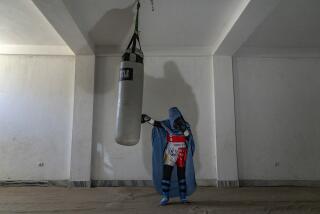As the Taliban Fades, Fear and Uncertainty Remain
- Share via
SPIN BULDAK, Afghanistan — In this old smuggling center at the outer edge of the Taliban’s shrinking empire, the signs are there: Authority is gradually slipping away.
Along the dusty bazaar that strings out along the main road through town, a few women walk without fully covered faces, an act hardly dared in the heyday of the Taliban’s Islamic fundamentalist state. Discipline has relaxed, some say, because the Taliban needs all the backing it can get from those Afghans it still rules.
Stringent enforcement, they say, would only further erode support for a regime that is already viewed as nearing its end. But in a part of the world where law and order are traditionally maintained as much through fear as through respect, the sense that the regime is finished has allowed lawlessness to creep in.
After inviting a large group of foreign reporters to the town for a news conference with their leaders today, officials were forced to place the journalists in a walled and guarded compound to guarantee their safety.
Still, a group of youths hurled rocks at the journalists’ vehicles as they passed into Afghanistan, smashing the windows of two cars.
Then there was Najibullah Akhund Shirzai, the Taliban’s head of public security for Spin Buldak. Wearing sunglasses and a turban as black as his beard, he rejected quietly, but with utter certainty, any suggestion that his government might be in its death throes. He insisted that the Taliban’s spectacular retreat from most of northern Afghanistan over the last 10 days had, in fact, been a carefully ordered withdrawal.
“Yes, a counteroffensive will come,” he said.
He also denied that Taliban leaders in Kandahar, about 40 miles to the north, were negotiating the surrender of the movement’s spiritual capital.
“Absolutely false,” he said, stating that Taliban leader Mullah Mohammed Omar remained in the city and that his followers were prepared to fight and defend it “to the death of our last man.”
The intensity of his message left the impression that he was working as hard to convince himself as those around him. With Taliban officials present, the citizens of Spin Buldak mouthed a strikingly similar line.
And although the Taliban may have been forced to retreat from much of Afghanistan, its gritty bazaars and rutted roads are teeming with armed Taliban fighters.
In their trademark pure black or pure white turbans, they saunter along the main road, girded with ammunition belts and Kalashnikov rifles, often surrounded by crowds of admiring boys. They walk purposefully in and out of the Kandahar Provincial Foreign Ministry compound, their headquarters here, and when they hear the call to prayer, they drop to their knees and bow their heads to the ground in the courtyard.
But probe privately among the ordinary people of Spin Buldak and such devotion is far harder to find. Instead, fear and apprehension are the dominant emotions.
Some are afraid of American bombing. Others fear that the town is slipping into anarchy as the Taliban loses control.
Remah Tullah, who has run a general store in the main bazaar area for 15 years, said that sporadic looting of shops had begun to take place late at night and expressed concern that he might be next.
“I’m taking all the money home with me every day because I’m afraid of that,” he said.
A prominent physician, Nig Mohammad, said he used to sleep each night in his clinic, but since Afghanistan became the target of American reprisals after the Sept. 11 terrorist attacks against the World Trade Center and the Pentagon, he has become too nervous to spend more than one night in the same place.
“There’s a feeling among the common people here that at any time, bombardment could start,” he said.
Nearby Kandahar has suffered some of the most intense bombings of the 6-week-old American air campaign aimed at breaking the Taliban’s hold on the country and flushing out Osama bin Laden.
Even some Taliban see no future in the movement they served, and they are looking for a way out.
“Every day, some of the Taliban are leaving here,” said Mullah Ismael, a non-Taliban cleric. “They are changing their clothes and shaving their beards; then they work in the market [for a few days] before crossing the border [to Pakistan] illegally.”
But Tuesday, many of the town’s residents appeared to put aside their concerns briefly when more than 100 foreign journalists arrived in their midst. Staring at a group of the visitors as they pulled in, two young men pointed curiously, then began discussing the spectacle.
“Look at them, they are here,” one said. “First they bomb us, then they come to visit.”
More to Read
Sign up for Essential California
The most important California stories and recommendations in your inbox every morning.
You may occasionally receive promotional content from the Los Angeles Times.













